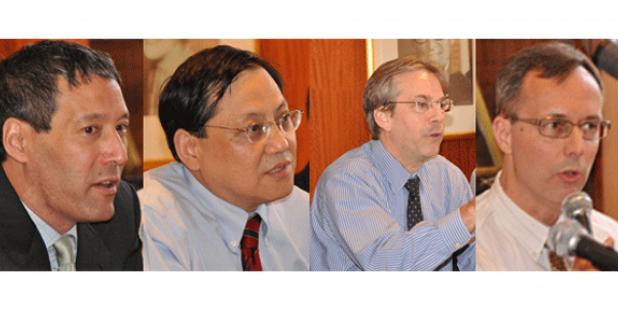Join us for a free one-day workshop for educators at the Japanese American National Museum, hosted by the USC U.S.-China Institute and the National Consortium for Teaching about Asia. This workshop will include a guided tour of the beloved exhibition Common Ground: The Heart of Community, slated to close permanently in January 2025. Following the tour, learn strategies for engaging students in the primary source artifacts, images, and documents found in JANM’s vast collection and discover classroom-ready resources to support teaching and learning about the Japanese American experience.
The Rise of China and the East Asian Regional Order
USC held a roundtable discussion in April 2011 on the rise of China and its implications for US-China relations.

With the rise of China at the dawn of the 21st century, there is a complex power transition taking place in the world in general and in East Asia in particular, where both the United States and China struggle to expand their respective influences without disrupting the foundation of prosperity and stability of the region. Will this transition continue to be a peaceful one where the American-led liberal institutions remain intact and influential? Or will the changing power balance gradually lead to disruption of regional and global order? By inviting the four prominent scholars of international relations and Chinese foreign policy, the forum addressed one of the most critical questions of this century.

G. John Ikenberry (Princeton University)
Click here to view John Ikenberry's presentation.

James T. H. Tang (Singapore Management University)
Click here to view James Tang's presentation.

Daniel Lynch (USC)
Click here to view Daniel Lynch's presentation.
David Kang (USC)
Click here to view David Kang's presentation.
Sponsor(s): USC US-China Institute, Center for International Studies, Korean Studies Institute, School of International Relations and East Asian Studies Center
Held at the Tyler Environmental Prize Pavillion on April 28, 2011.
The symposium was reported on by the Voice of America’s Chinese language service here.
 |
 |
Featured Articles
Please join us for the Grad Mixer! Hosted by USC Annenberg Office of International Affairs, Enjoy food, drink and conversation with fellow students across USC Annenberg. Graduate students from any field are welcome to join, so it is a great opportunity to meet fellow students with IR/foreign policy-related research topics and interests.
RSVP link: https://forms.gle/1zer188RE9dCS6Ho6
Events
Hosted by USC Annenberg Office of International Affairs, enjoy food, drink and conversation with fellow international students.
Join us for an in-person conversation on Thursday, November 7th at 4pm with author David M. Lampton as he discusses his new book, Living U.S.-China Relations: From Cold War to Cold War. The book examines the history of U.S.-China relations across eight U.S. presidential administrations.




